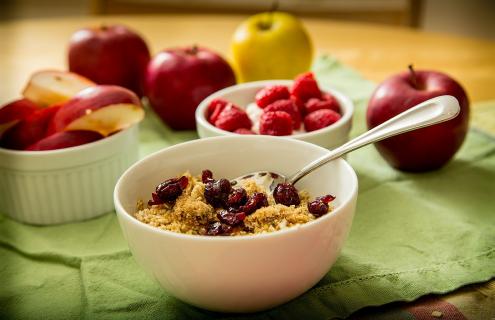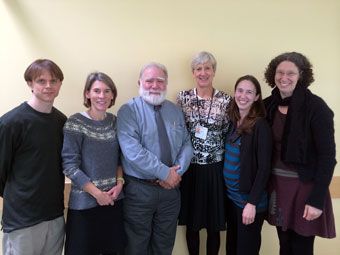
The idea is to empower clinicians and staff to model and promote healthy lifestyle behaviors and provide the nutritional and culinary skills to help treat and prevent chronic diseases.
Karen Huyck MD, PhD, MPHThe Link between Diet and Health
The link between diet and health is well established. Yet, when it comes to nutrition, studies show most physicians feel they're inadequately trained to provide guidance to patients on obesity and related health issues. "We know that the big health issues of our generation are chronic diseases and lifestyle-related diseases," says Karen Huyck, MD, PhD, MPH, Occupational and Environmental Medicine, "yet, our education hasn't caught up with that." Like other programs developing across the country, Dartmouth-Hitchcock's (D-H) recently launched Culinary Medicine Program is intended to bridge that gap and foster a healthy lifestyle culture. "Studies suggest that if providers eat well and are active they are more likely to talk to their patients about it," says Auden McClure, MD, MPH, co-director of the Pediatric Lipid and Weight Management Center at Children's Hospital at Dartmouth (CHaD), and a professionally trained chef. "If we give them the skills to do that," says McClure, "they are going to be more effective." She and Huyck are co-directors of the new Culinary Medicine program.
It All Starts with Breakfast
"Cook, Eat, Learn, the program's first initiative, is a year-long nutrition and culinary curriculum for medical students, residents, nurses, providers and staff. It involves serving a healthy breakfast to those attending the weekly Department of Medicine Grand Rounds, offering cooking demonstrations, a slide show with reinforcing nutrition information and a trivia contest with prizes.
Each session has a theme such as healthy portions, labels and calories, or mindful eating. "Topics vary," says McClure, "one week it's oils and fats, the next week it's carbohydrates, then it's seafood." Gone are the granola bars that used to be served. In their place are offerings such as "Papa Bear's Porridge," spinach frittatas and roasted veggie scramble, "recipes that are healthful but also cravable and delicious," says McClure. Recipes and handouts are available to participants to use for themselves and with their patients. Soon, a portable kitchen will be used for more hands-on demonstrations.
The Culinary Medicine Program reaches beyond Grand Rounds to nutrition efforts across D-H. "If the weekly Grand Rounds curriculum is about whole grains," says Deborah Keane, LD, RD, director of D-H Food and Nutrition Services, and member of the Culinary Medicine project team, "D-H cafeteria menus will focus on whole grains that week as well. "It's a coordinated effort," she says. We debuted Papa Bear's Porridge in the Dining Room and that was the first breakfast item we served at CEL. Now other departments are requesting the same hot cereal at their department meetings."
Diet-influenced Medical Conditions
Increases in obesity and diabetes rates have created a huge public health challenge. "With over 75 medical conditions associated with obesity contributing to a growing economic burden from associated health care costs, it is paramount that our departments and institutions dedicate energy and resources towards addressing obesity at every level" says Department of Medicine Chair, Richard Rothstein, MD. "The Culinary Medicine Program will have an important impact," he says, "by further educating our trainees, clinicians and staff about healthy eating so that they are more prepared to have these conversations with their patients, families and colleagues."
"Even though lifestyle counseling has the potential to promote healthy choices," says Huyck, "clinicians often don't address these topics with their patients due to a lack of time, knowledge or skills." Robert McLellan, MD, MPH, section chief of Occupational and Environmental Medicine, adds, "If a physician is going to bring up diet, the approach has typically been 'you really need to do something about your weight' or, here's a 1500 calorie diet,' and that doesn't work."
Response
The response so far has been great, says Huyck. "People come up and ask questions. They LOVE the breakfast. I think it's starting to catch on," she says. As one recent participant said during the session, "This shrimp breakfast burrito is the best thing that has happened to me all week!" Huyck and McClure believe the weekly sessions will create awareness about the link between health and nutrition, encourage people to be creative about food, and begin to address gaps in nutrition education in fun and creative ways.
Tara Efstathiou, MS, RD, LD, who staffs the sessions with Keane, Huyck and McClure, is excited to see more providers and staff attending. "I'm encouraged that as the weeks go by, more providers are showing an increased interest in nutrition basics and inquiring as to how they can offer this information to their patients; the recipes are peaking their interest as well as their taste buds and that is wonderful to see.
"We hope that offering healthy and delicious foods will energize and nourish the body and inspire healthy personal and professional practices," says Heather Wolfe, MPH, RDN, LD, a registered dietician on the project, and adds, "Ultimately, creating a healthier food environment at DHMC [Dartmouth-Hitchcock Medical Center] helps promote the D-H vision of achieving the healthiest population possible."
Next Steps
This year is considered a learning year for the program in terms of developing the curriculum, getting feedback and going over evaluations. "Surveys will be conducted at three months, six months and at the end of the course," says Huyck, "to see if there's been any change in how comfortable providers feel about nutrition and culinary skills in their own life, and also in terms of counseling and treating their patients."
"This is a first step," says McClure, "we'd eventually like to do classes with families. We envision using a demonstration kitchen where both providers and patients can come and learn about healthy eating and culinary skills—maybe even tape them so they could be used as learning modules," she says. "There's a lot more on the horizon."
"Ultimately," says Huyck, "this is something that could save lives."
 The Team: Members of the D-H Culinary Medicine Program team (from left to right):
The Team: Members of the D-H Culinary Medicine Program team (from left to right):
- Jonathan Burgess, chef, Geisel School of Medicine, chef
- Auden McClure, MD, MPH, CHaD Pediatrics, CHaD Pediatric Lipid and Weight Management Center, chef
- John Butterly, MD, executive medical director for External Affairs
- Deborah Keane, LD, RD, director, D-H Food and Nutrition Services
- Heather Wolfe, MPH, RDN, LD, health coach and dietitian for Live Well/Work Well
- Karen Huyck, MD, PhD, MPH, Occupational and Environmental Medicine
- Tara Efstathiou, MS, RD, LD, dietitian for D-H Food Services (not shown)
- William Jones, executive chef, D-H Food and Nutrition Services (not shown)
- Cathy Beaver, MD, General Internal Medicine (not shown)
- Ellen Heuduska, RN, MPH, CCM, CHaD Pediatrics (not shown)